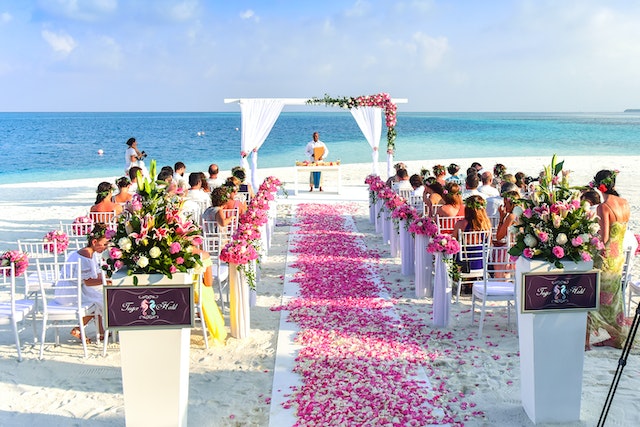
1. Set a Budget
The wedding will need adequate financing, which calls for prudent budgeting. Setting the budget might be less fun and exciting, but it is the initial step taken that influences the rest of the wedding planning. The budget determines when and how other things fall into the wedding plan.
You do not want to identify the best vendor, venue, dress, and other essentials for your Big Day only to realize it’s all beyond what you can afford. Therefore, consult your spouse, parents, friends, and other potential contributors to help you draw a budget that ensures you have a memorable nuptial ceremony.
2. Use a Wedding Planning App
You probably will be up and about as you juggle work and planning for the wedding. Hence, it is best to consider tools that can help you sort things while on the go instead of waiting until you are behind a computer or desk to pen in your diary. The WeddingWire app is an excellent example of a mobile application you can use to browse, find contacts and more information as you plan your wedding.
3. Get Inspired
Getting inspiration can help the process feel like it is rolling along like a breeze. You have ideas of how you want the ceremony to look. It can have a formal vibe or a super-classic feel. Conversely, you can settle for a rustic and relaxed style.
It is best to start sourcing inspiration from Instagram, Pinterest, and other online platforms with the latest wedding trends aligned with your vision. Take note of the décor theme, colours, event lighting hire, and additional details. However, we recommend finding a venue and setting a date before kicking your inspiration search into high gear.
4. Sort Your Guest List
Having an estimated guest count early on when planning your wedding is essential, although the final guest list can be ironed out later in the process. The objective is to picture how big of a ceremony to expect. Will it be a 300-person occasion or under 100 invitees because the guest count influences the venue options? Therefore, sort your guest list before searching for the perfect venues.
5. The Wedding Party
Once you finish the guest list, you can focus on who you want standing beside you on that ceremonious day. Select your best man and woman, the bridesmaids, groomsmen, flower girls, and page boys. You then must ask them if they would consider taking on the roles.
6. Choose Potential Dates
While many people will set an official wedding date after booking a venue, it is best o identify several potential dates before finding the venue. Consider the season and correlating weather conditions. Also, which day of the week do you want? For instance, you can settle for open grounds and lush greenery when you will likely have heavy cloud cover and cold winds.
On the other hand, a wedding on late Saturday afternoon progressing well into the night will be great but could be more expensive and competitive. Moreover, you must review the dates while considering work schedules, family events, and holidays to ensure they do not conflict. Identify a few potential dates to help with the venue selection.
7. Pick a Venue
Your budget, guest count estimates, and possible dates for the wedding will be essential details informing your decision on the location you want. It means the place is within your budget, can accommodate the guests, and you will not book a competitive date.
8. Start Your Registry
Friends and loved ones will quickly inquire where you are registered immediately after you announce your engagement. Hence, it is best to create a wedding registry soon after your engagement and in the earlier stages of planning your wedding.
Your family and friends might want to purchase gifts, and the registry makes the gifting experience more guided and fun for your guests and loved ones. Please note that the wedding registry is a convenience, not an order, and you can make changes or additions later as you plan for the Big Day.






